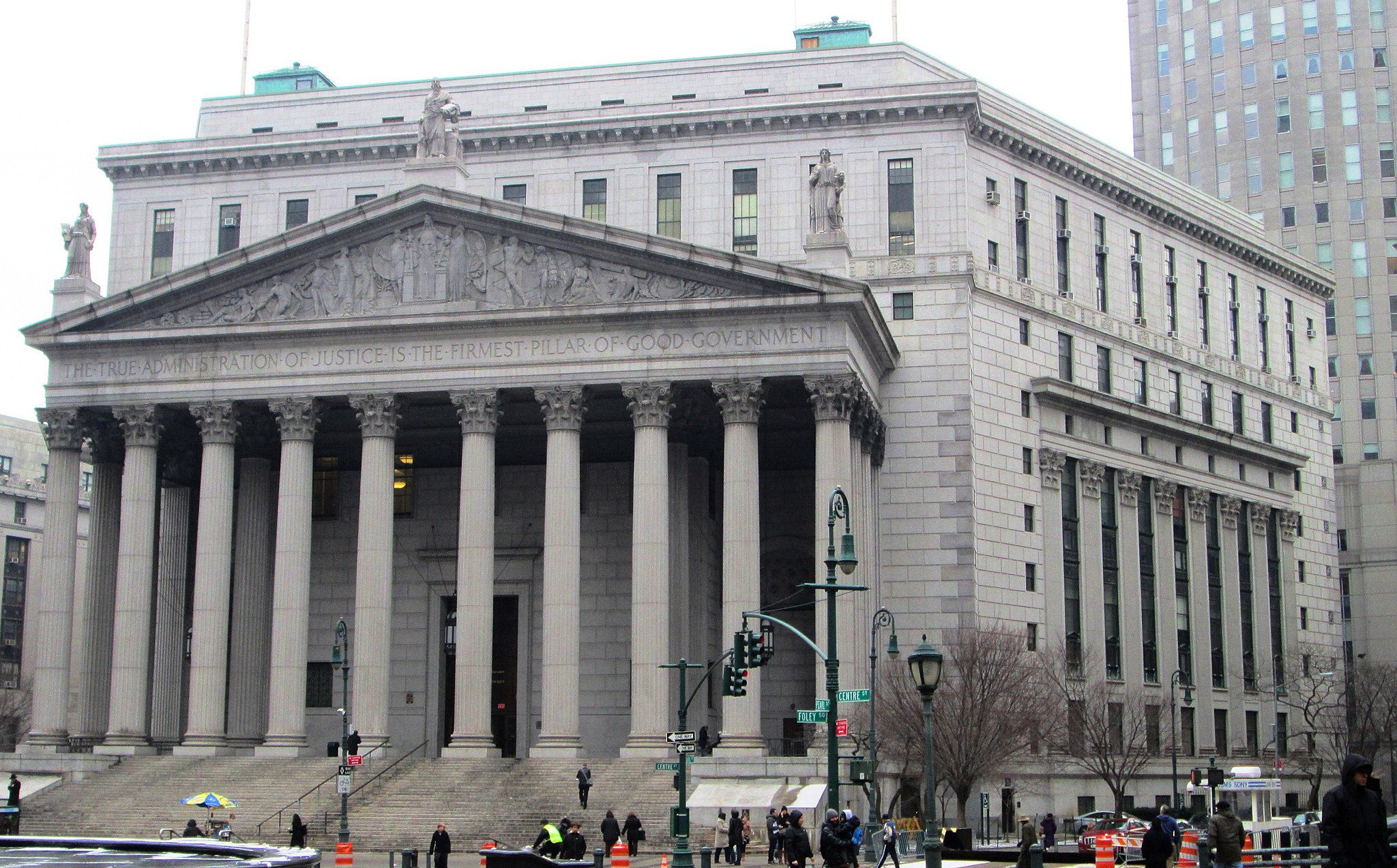Today's Headlines and Commentary
The Senate intelligence committee held a hearing Tuesday on worldwide threats. The committee heard testimony from the country’s top intelligence officials: Dan Coats, the director of national intelligence, Mike Pompeo, the CIA director, Adm. Mike Rogers, director of the National Security Agency, Lt. Gen. Robert Ashley, director of the Defense Intelligence Agency, Christopher Wray, director of the FBI, and Robert Cardillo, director of the National Geospatial-Intelligence Agency.
Published by The Lawfare Institute
in Cooperation With

The Senate intelligence committee held a hearing Tuesday on worldwide threats. The committee heard testimony from the country’s top intelligence officials: Dan Coats, the director of national intelligence, Mike Pompeo, the CIA director, Adm. Mike Rogers, director of the National Security Agency, Lt. Gen. Robert Ashley, director of the Defense Intelligence Agency, Christopher Wray, director of the FBI, and Robert Cardillo, director of the National Geospatial-Intelligence Agency.
During the hearing, the intelligence chiefs warned that Russia will attempt to disrupt the 2018 midterm elections, the Washington Post reports. Coats stated that Russia will use false personas, propaganda, and social media in its efforts to sabotage the elections. These tactics mark a continuation of Russia’s broader strategy of disruption, one Moscow views as having succeeded in 2016, Coats observed. CIA director Mike Pompeo agreed with Coats’s remarks, and added that the CIA stands ready “to identify elements of Russia’s information campaign and work with domestic law enforcement to respond,” the New York Times adds. Action of the kind Pompeo described is just the beginning of what Sen. Mark Warner, vice chairman of the intelligence committee, wants, the Post continues. Criticizing the intelligence heads, Warner stated that the Russian “threat demands a whole-of-government response, and that needs to start with leadership at the top.” The vice chairman took particular aim at President Trump, saying that “the president inconceivably continues to deny the threat posed by Russia. He didn’t increase sanctions on Russia when he had the chance to do so.”
Coats also remarked that the U.S. is running out of time to mitigate the threat posed by North Korea, Reuters reports. Coats described this threat as “potentially existential,” and noted that “decision time” is nearing. While Coats said he hopes America will reach a peaceful settlement with Kim Jong Un, he added that North Korea’s repeated claims that its nuclear program has ensured the country’s survival indicate that North Korean leaders “do not intend to negotiate [their nuclear weapons] away.” Rather, as CIA director Mike Pompeo observed, North Korea seeks to remain a nuclear threat to the United States.
In part because of the persistent threat posed by North Korea, Coats warned that the risk of international conflict has reached its highest point since the end of the Cold War, CNN reports. According to Coats, other major phenomena contributing to this risk of global conflict include: “Saudi-Iranian use of proxies in their rivalry”; the “threat of state and non-state use of weapons of mass destruction”; and Russian and Chinese cyber and information warfare against the United States as a means to undermine American influence around the world.
In a response that conflicted with the account provided by the White House, Wray said that the bureau first alerted the Trump administration to issues with its background check of former staff secretary Rob Porter in March, the Wall Street Journal reports. The bureau “administratively closed” Porter’s file in January, but then passed along “some additional information” it received about Porter earlier this month. Wray’s account of events contradicts the account provided by the White House, which described the FBI’s investigation of Porter as “ongoing.” In claiming that the bureau had not concluded its inquiry into Porter’s past, the White House “has sought to shift the focus away from its handling of domestic-abuse allegations against Mr. Porter.” According to the White House, Porter never received a permanent security clearance. Rather, he and a group of top administration officials, including Jared Kushner, have held interim security clearances for more than a year as they worked in the White House. Tuesday afternoon, the White House indicated that it stands by its handling of Porter.
Coats described the government’s system of granting security clearances as “broken” and called for a “revolutionary change” in how the government screens its personnel, the Associated Press reports. In response to the allegations of domestic abuse against Porter, Coats suggested that the government capitalize on new advances in technology and the information available on social media to provide “early awareness of individuals.” Because of the length and inefficiency of the security clearance process, some 700,000 reviews have been held up across the government. Coats highlighted the danger of this problematic process: “it is really undermining our ability to get the right people into the right place at the right time.”
In what amounted to an exhaustive testimony, Coats also emphasized the threat that America’s growing debt poses to national security, Politico reports. Admitting that he was beginning to drift “a bit out of [his] lane” and qualifying that he did not want “to come back and preach at [the committee],” Coats derided Congress’s failure to decrease the deficit and plan responsibly for the future as a “dire threat to our economic and national security.” Sen. Joe Manchin, a Democrat from West Virginia, voiced his agreement with Coats’s warning.
Secretary of State Rex Tillerson said on Tuesday that the fight against the Islamic State in Iraq and Syria is far from over, the Post reports. The secretary announced $200 million in American aid to stabilize communities devastated by war so their residents can return home. Tillerson explained the surge in aid, stating that “if communities in Iraq and Syria cannot return to normal life, we risk the return of conditions that allowed ISIS to take root.” At a meeting with more than 70 countries that contributed to the American-led coalition’s efforts to destroy ISIS, Tillerson encouraged actors to focus their attention on fighting extremists in the Middle East and elsewhere; he warned against becoming distracted by “regional rivalries and disputes.” While in Kuwait, Tillerson will also take part in a conference to raise money for infrastructure repair in Iraq. Iraq requires a minimum of $88 billion to restore essential services.
Four Russian nationals and possibly dozens more died during an American-backed attack in Syria, the New York Times reports. The fighting took place on Feb. 7 and 8 in eastern Syria between pro-regime forces and fighters from the U.S.-led coalition against the Islamic State. Col. Ryan Dillon, a spokesman for the U.S. military, said that coalition and Russian officials kept in close contact before, during, and after the American-backed attack to ensure that no Russian troops were in the vicinity when coalition forces struck back at pro-regime fighters in response to their earlier, unprovoked attack. The Kremlin has emphasized that no members of the Russian army were killed and that any Russians fighting alongside the pro-government fighters were mercenaries.
The Defense Department requested $69 million to replace Camp 7—the top secret prison at Guantanamo Bay that holds the accused 9/11 mastermind and other military prisoners—as part of its 2019 budget proposal, the Miami Herald reports. This request resurrects a project pushed by White House Chief of Staff John Kelly when he served as the head Marine general at U.S. Southern Command. Camp 7 currently contains 15 prisoners, making the cost of the proposed construction $4.6 million per detainee.
ICYMI: Yesterday on Lawfare
Josh Blackman offered his thoughts on the meaning of judicial resistance in the Trump administration.
Susan Landau argued that law enforcement must expand its training and expertise in digital investigations to combat the rise in criminal activity online.
Nora Ellingsen and Benjamin Wittes reported that career officials at the Justice Department did not support President Trump’s false claim that the “vast majority of individuals convicted of terrorism and terrorism-related offense since 9/11 came here from outside of our country” based on internal documents obtained under the Freedom of Information Act.
Anne Boustead announced her latest essay in the Aegis Paper Series, “Small Towns, Big Companies: How Surveillance Intermediaries Affect Small and Midsize Law Enforcement Agencies.”
Robert Chesney argued that captured Islamic State terrorists Alexanda Kotey and El Shaffee Elsheikh should be brought to the U.S. for trials in civilian court.
Email the Roundup Team noteworthy law and security-related articles to include, and follow us on Twitter and Facebook for additional commentary on these issues. Sign up to receive Lawfare in your inbox. Visit our Events Calendar to learn about upcoming national security events, and check out relevant job openings on our Job Board.


.jpg?sfvrsn=31a7c788_5)


